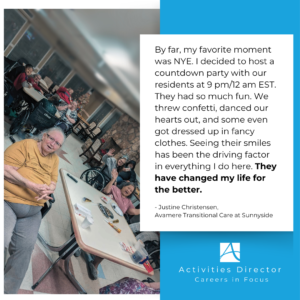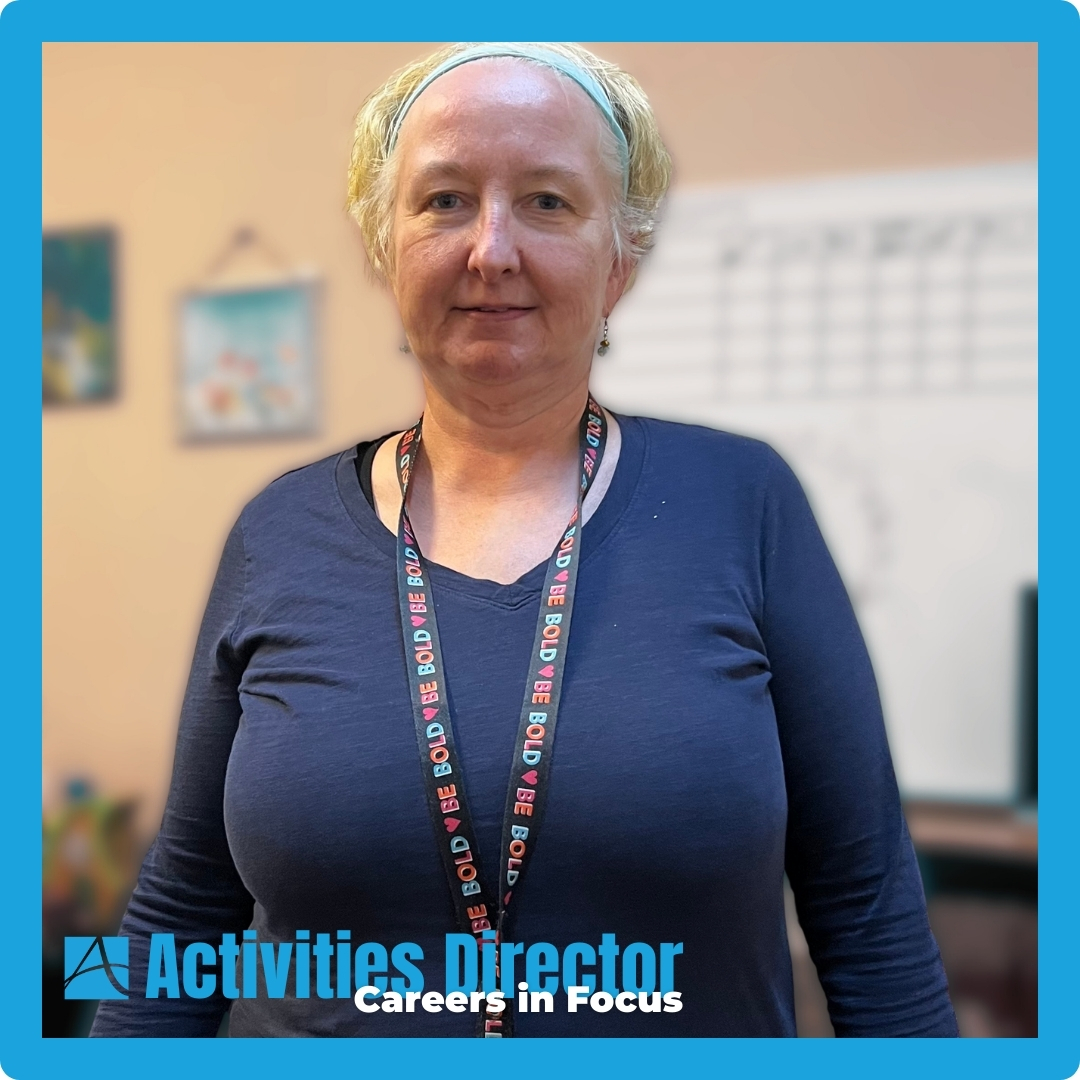“My husband came to visit me, and he found me working on a puzzle with a resident. He asked me later, ‘Do you really get paid to play puzzles?’ and I said, ‘I do, but it’s so much more than that! I once had a resident who would get easily overwhelmed, emotional, and then shut down and just stay in their room. But I could sit with them, and we would work on a puzzle, and I would ask them questions about themselves, and that slowly started to pull them out of their shell. They started to call people and write letters to their friends and got out of that isolation.” – Michelle M., Keizer Court, Activities Director
Games and play are often considered as activities for children. However, numerous case studies and the National Institute of Play suggest that play is vital for the health and well-being of individuals at any age. In January, we celebrated Activities Professional Week where we recognized the contributions of Activities Directors and their teams. I had the opportunity to talk to our activities professionals about their work, the misconceptions surrounding it, and why they love it! They explained that games and play go beyond mere entertainment and are integral to promoting health and wellness.
Let’s explore one of the significant misunderstandings about their invaluable profession: “All they do is play games”

Activities Professionals are not just responsible for organizing games and recreational activities. They play a vital role as valued members of the interdisciplinary healthcare team. They actively participate in providing comprehensive patient care from the moment a patient is admitted, addressing their social, psychosocial, and physical needs through an extensive range of activities. In addition to organizing recreational activities, they act as coordinators for important communication channels such as resident councils and family councils, ensuring feedback and mutual understanding is systematic and effective. Activities Directors not only help residents re-establish relationships and a sense of community, but they also serve as the lynchpin that connects the staff within each facility as a united team. Their multifaceted contributions make them true Healthcare Heroes, transforming play into a powerful tool for holistic well-being.
When someone lands in a nursing facility or long-term care, they are suddenly removed from all of their usual activities, communities, and relationships. Activity Professionals use games and activities to help bridge the gap between normal life and life at a nursing facility. Activities provide a space for community, connection, problem-solving, and pro-mental health activity.
From movie nights, snack carts, karaoke, pet-therapy, art projects, to good old-fashioned bingo, each activity is carefully considered and planned based on popularity and patient needs. Not everyone wants to come out of their room and participate in a group activity. Activity professionals visit patients in their rooms to engage them in puzzles, trivia, and reading fun facts or customized activities for better connection and engagement.
“I had one resident who didn’t know how to get their stories out to their family. They have 11 kids who are scattered across the world. So I got a tape recorder, and we started recording her telling her stories so she could send them to her family.” – Michelle M., Keizer Court, Activities Director
Activities Professionals are responsible for organizing activities and events not only for the residents but also for the staff. They bring people together as a team and work towards building a positive work environment. For instance, Shirlene is an Activities professional who is always ready to help her team wherever she is needed. During the recent winter storm, she arrived early at work to provide a special quiche breakfast for the residents anticipating that staff would face difficulties in reaching the facility. Similarly, Michelle, who has over 20 years of CNA experience, is known as “Google” among her colleagues for her willingness to assist in any way she can to ensure the residents receive the best care and her team is supported.

Beyond Events
Did you know that being an Activities Professional is not just about having fun and organizing exciting events for patients and residents? In fact, the job involves a surprising amount of paperwork and computer work! Every time a new patient or resident is admitted, they get an Activities interview to assess how to best engage with them during their stay. The Activities Professional then plans out all of the group and individual activities and is responsible for documenting everything they plan to happen and everything that has happened. So, it’s not just about having fun and games, but it’s also about meticulous planning and keeping track of all the details. It may not be the most glamorous part of the job, but it’s certainly an essential one!
Activities Directors have an important role beyond engaging with their facilities. They also foster relationships between different community programs. For instance, art and pen pal programs connect facilities with elementary schools, promoting an exchange of creativity. Students create art that is displayed within facilities, while residents share stories through letters and art. The outcome is an intergenerational gallery that echoes shared stories. They also organize super-fun pet therapy sessions! One of the most popular four-legged visitors at Avamere at Waterford and Three Fountains is Gunner, who never fails to put a smile on everyone’s face! And at Keizer, they take things to the next level by partnering up with a local senior center to share the joy of pet therapy!
The significance and value of Activities Professionals cannot be overstated. These individuals form an essential part of the healthcare team by providing patients with engagement, excitement, and social interaction, which can have a profound impact on their overall well-being. Activities such as playing bingo and solving puzzles may appear to be simple pastimes, but they offer cognitive and social benefits that make them valuable for people of all ages.
We are lucky to have these professionals working tirelessly to improve the patient experience, and we want to acknowledge and celebrate their contributions!






